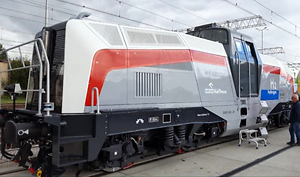REVIEW PAPER
Types and applications of hydrogen fuel cells in transport
1
Center of Rail Vehicles, Łukasiewicz Research Network - Poznan Institute of Technology, Polska
2
Ukrainian State University of Science and Technologies, Lviv Polytechnic National University, Ukraine
Submission date: 2022-09-09
Final revision date: 2022-11-25
Acceptance date: 2022-11-30
Online publication date: 2022-11-30
Publication date: 2022-12-28
Corresponding author
Dawid Gallas
Center of Rail Vehicles, Łukasiewicz Research Network - Poznan Institute of Technology, Polska
Center of Rail Vehicles, Łukasiewicz Research Network - Poznan Institute of Technology, Polska
Rail Vehicles/Pojazdy Szynowe 2022,3-4,31-36
KEYWORDS
TOPICS
ABSTRACT
The article summarizes the types of hydrogen sources and the possibilities of using hydrogen in fuel cell technologies. The types of hydrogen fuel cells and solutions used in hydrogen powered drives were discussed. The current economic and ecological aspects affecting the possibilities and profitability of using various types of hydrogen as an alternative fuel in various forms of transport were analyzed, and forecasts for the development of this form of propulsion and power supply in transport for the coming years were presented. It was concluded that only a simultaneous increase in hydrogen production, through an increase in demand or technological development, combined with a decrease in the cost of hydrogen cells down to a level of at least $40/kW, would enable the proliferation of hydrogen technologies in all modes of transport.
REFERENCES (12)
1.
Stobnicki P, Gallas D. Adoption of modern hydrogen technologies in rail transport. J Ecol Eng. 2022;23(3): 84-91. https://doi.org/10.12911/22998....
2.
Alazemi J, Andrews J. Automotive hydrogen fuelling stations: An international review. Renew Sust Energ Rev. 2015;(48):483-499. https://doi.org/10.1016/j.rser....
3.
Badwal SPS, Giddey S, Munnings C, Kulkarni A. Review of progress in high temperature solid oxide fuel cells. J Aust Ceramics Soc. 2014;50(1):23-37. https://doi.org/10.1002/CHIN.2....
4.
Chmielniak T, Lepszy S, Mońka P. Energetyka wodorowa – podstawowe problemy. Polityka Energetyczna – Energy Policy Journal. 2017;20(3):55-66.
5.
Eckermann E. World history of the automobile. Society of Automotive Engineers International. 2001, 382. https://www.amazon.com/World-H....
6.
European Commission, A hydrogen strategy for a climate-neutral Europe. 8.6.2020. https://ec.europa.eu/energy/si....
7.
Gis W, Menes M, Pielecha J. et al. Implementation of vehicles equipped with fuel cells and hydrogen refueling infrastructure in Europe. Combustion Engines. 2015;162(3):782-787.
8.
Jouin M, Bressel M, Morando S, Gouriveau R, Hissel D, Péra M-C et al. Estimating the end-of-life of PEM fuel cells: Guidelines and metrics. Appl Energ. 2016; (177):87-97. https://doi.org/10.1016/j.apen....
9.
Kakoulaki G, Kougias I, Taylor N, Dolci F, Moya J, Jäger-Waldau A. Green hydrogen in Europe – A regional assessment: Substituting existing production with electrolysis powered by renewables. Energ Convers Manage. 2021;(228):113649. https://doi.org/10.1016/j.enco....
10.
Luo Y, Wu Y, Li B, Mo T, Li Y, Feng S-P et al. Development and application of fuel cells in the automobile industry. J Energ Storage. 2021;(42):103124. https://doi.org/10.1016/j.est.....
11.
National Energy Technology Laboratory – Solid Oxide Fuel Cell Program. Fuel Cell fact sheet. US Department of Energy. Program 133, 2021. https://www.netl.doe.gov/sites....
12.
Sdanghi G, Maranzana G, Celzard A, Fierro V. Review of the current technologies and performances of hydrogen compression for stationary and automotive applications. Renew Sust Energ Rev. 2019;(102):150-170. https://doi.org/10.1016/j.rser....
Share
RELATED ARTICLE
We process personal data collected when visiting the website. The function of obtaining information about users and their behavior is carried out by voluntarily entered information in forms and saving cookies in end devices. Data, including cookies, are used to provide services, improve the user experience and to analyze the traffic in accordance with the Privacy policy. Data are also collected and processed by Google Analytics tool (more).
You can change cookies settings in your browser. Restricted use of cookies in the browser configuration may affect some functionalities of the website.
You can change cookies settings in your browser. Restricted use of cookies in the browser configuration may affect some functionalities of the website.



